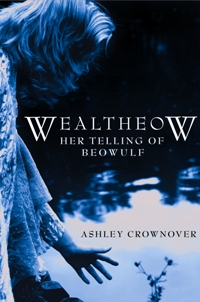 In her novel Wealtheow, author Ashley Crownover retells Beowulf from Queen Wealtheow’s point of view. In the original epic poem, Wealtheow doesn’t have much of a voice. Her marriage to King Hrothgar is more a matter of politics than love, and her role in the poem is largely limited to an episode where she speaks up to secure her own genealogical futurity. Adopting a first-person voice, Crownover portrays Wealtheow as a young, somewhat naive bride thrown into a political marriage arranged to prevent war between the Danes and the Helmings. Wealtheow tries to fit into her new role as wife and queen, as well as her new culture, and strives to produce an heir for Hrothgar, suffering miscarriages and other adversities. Crownover parallels Wealthow’s plighted road to motherhood in the tale of Grendel and his mother (called Ginnar here). When Grendel is born deformed, his father rejects him and he is bound for infanticide–only Ginnar’s motherly instinct resists custom, and the pair become fugitives. Crownover’s technique here builds sympathy for Ginnar in echoing the narrative proper of Wealtheow. Ginnar in many ways is a far more sympathetic (and interesting) character than Wealtheow, and the counter-plot of her and her monster-spawn/beloved boy Grendel is the highlight of the book.
In her novel Wealtheow, author Ashley Crownover retells Beowulf from Queen Wealtheow’s point of view. In the original epic poem, Wealtheow doesn’t have much of a voice. Her marriage to King Hrothgar is more a matter of politics than love, and her role in the poem is largely limited to an episode where she speaks up to secure her own genealogical futurity. Adopting a first-person voice, Crownover portrays Wealtheow as a young, somewhat naive bride thrown into a political marriage arranged to prevent war between the Danes and the Helmings. Wealtheow tries to fit into her new role as wife and queen, as well as her new culture, and strives to produce an heir for Hrothgar, suffering miscarriages and other adversities. Crownover parallels Wealthow’s plighted road to motherhood in the tale of Grendel and his mother (called Ginnar here). When Grendel is born deformed, his father rejects him and he is bound for infanticide–only Ginnar’s motherly instinct resists custom, and the pair become fugitives. Crownover’s technique here builds sympathy for Ginnar in echoing the narrative proper of Wealtheow. Ginnar in many ways is a far more sympathetic (and interesting) character than Wealtheow, and the counter-plot of her and her monster-spawn/beloved boy Grendel is the highlight of the book.
Inevitably, Wealtheow must invite comparison to John Gardner’s masterpiece Grendel, the 1971 cult novel that retells the story from the monster’s point of view. Unlike that work, which is densely poetic, ambiguous, and often lyrically experimental, Crownover relates Wealtheow in a simple, straightforward style. The writing is thrifty and competent, and propels the narrative forward with ease. It’s tempting to pigeonhole Crownover’s effort as a feminist revision of an overtly-masculine text, and there’s of course merit in such a description–she does, after all, take a woman’s viewpoint here (or, arguably, the viewpoints of two women). But Crownover’s depiction of Wealtheow–and the men in the narrative–never unravels into gender politics (or, worse, tempting revisionist caricatures). Instead, she keeps the narrative upfront. It’s not as subtle (or ironic) as The Penelopiad, Margaret Atwood’s marvelous retelling of The Odyssey from Penelope’s perspective, but it does adhere to the same complex view of male-female relations. Fans of Marion Zimmer Bradley’s Avalon series and Beowulf enthusiasts in general will want to check this out.
Wealtheow is available now from Iroquois Press.

http://www.also-shoes.com Nike Dunks For Sale
LikeLike